Feline Hypothyroidism Symptoms
Feline hypothyroidism is a disorder of the endocrine system. Hypothyroidism has been found to be exceedingly rare in cats, despite its regular diagnosis in humans and dogs. Hypothyroidism occurs because of underachieving thyroid glands. These glands are tasked with adequately allocating enough hormones to fuel the body’s metabolism and organs. Without enough hormones being supplied, the body begins to slow down in a number of ways.
Signs and Symptoms
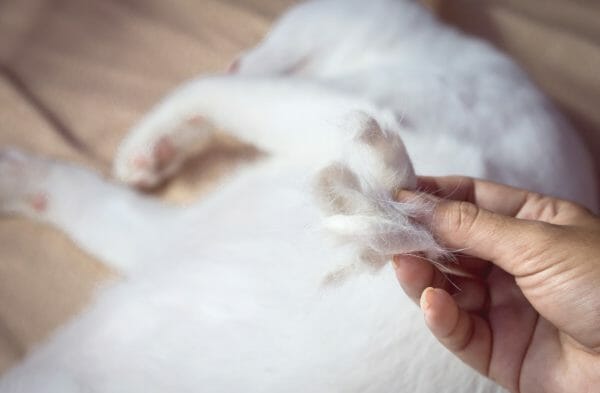
If the thyroid glands of the endocrine system continually fall short in yielding the hormones T3 and T4 (both of which are essential to the normal functioning of the metabolism), some or all of the listed symptoms may arise:
- Slow, tired behavior (increasingly low activity levels)
- Disheveled, matted coat
- Hypothermia
- Alopecia (hair loss)
- Mental confusion
- Unexplained weight gain
- Pale mouth
It is crucial to bring the cat to the vet if these symptoms begin showing up unexpectedly together. Not only is it important for the cat to receive a proper diagnosis and treatment, but it is also a good idea to rule out any other potential issues. Sometimes feline anemia can show some symptoms of hypothyroidism, so make sure and get your cat checked for this condition, too.
How Do Cats Get Hypothyroidism?
Iatrogenic Hypothyroidism
For cats, iatrogenic hypothyroidism usually comes as a byproduct of treatment interventions for hyperthyroidism, which is when too many hormones are being pumped into the bloodstream.
Although it is very uncommon, some cats diagnosed with hyperthyroidism (an arguably more serious condition) must undergo treatments such as surgery, intensive therapies, and daily administration of medication two times per day.
Although it is good that these treatment endeavors work exceedingly well at reversing the hyperthyroid condition, it can sometimes go too far. If the treatment is too effective, it has the potential to throw the endocrine system in reverse—thereby producing insufficient supplies of the necessary hormones. At this point, the cat has gone from being hyperthyroid to hypothyroid.
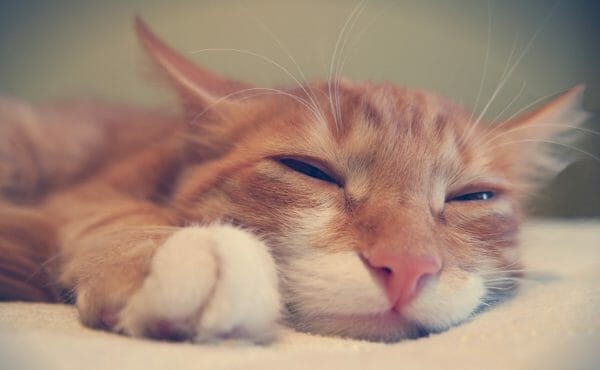
Congenital Hypothyroidism
The cause of congenital hypothyroidism in cats lies in the feline’s genetics. In scientific terms, the abnormal mutation of the TPO gene has been directly linked to the genetics-based onset of this disorder.
Spontaneous (Primary) Hypothyroidism
Although this is the rarest type of hypothyroidism, some cases do exist of cats randomly experiencing their thyroid glands malfunctioning. Quite literally, there is no known cause in this case. The glandular system simply begins to underperform for no apparent reason.
What Kind of Treatment Is Needed for Hypothyroidism in Cats?
If the hypothyroidism is identified as being iatrogenic in nature, this tends to be the most easily treatable form of this endocrine disorder. All that is usually needed to bring the levels to a homeostatic state is either discontinuing or adjusting the treatment for hyperthyroidism. Once this is done, the levels should return to normal after a few weeks of the body adapting.
In this situation and almost every other, this thyroid condition is said to be transient, meaning it is temporary and self-correcting without further need for treatment.
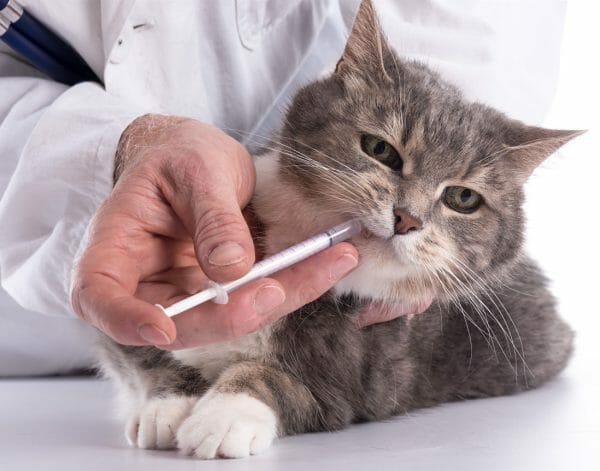
When is Medication Needed?
With spontaneous or congenital forms of hypothyroidism, some type of treatment is often needed. This is especially true if the levels fail to normalize on their own or the symptoms worsen.
Luckily, treatment is noninvasive and simple to implement. An effective medication that vets often prescribe for hypothyroidism in cats is levothyroxine—although liothyronine is also an option. These are synthetic hormone supplements that work to facilitate regular hormone production.
After the vet has evaluated the cat’s blood work, a proper dosage will be prescribed. Some felines have very stable levels over time, while others have levels that tend to rise and fall. Cats that experience the latter situation will need their levels monitored closely in order for the correct dosage to be given.
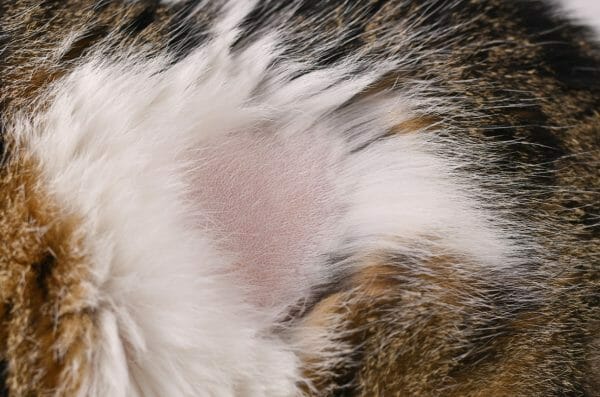 Once the medication is being consistently given, the feline should see its hypothyroidism symptoms completely subside over the following months. Besides consistent use of medication, the cat will need to regularly visit the vet for blood tests to track its hormone production.
Once the medication is being consistently given, the feline should see its hypothyroidism symptoms completely subside over the following months. Besides consistent use of medication, the cat will need to regularly visit the vet for blood tests to track its hormone production.
How Much Will Medication Cost?
It is difficult to approximate an exact amount for hypothyroidism medication. Costs will depend on whether it is used on a monthly or yearly basis. Factors such as insurance coverage, dosage, and frequency of administration will also affect the overall cost. However, a medication such as levothyroxine is typically on the more inexpensive side.
Food and Diet Recommendations
An integral aspect of treating hypothyroidism, especially at the outset, is the cat’s diet. In order to supplement the treatment plan that was jointly decided upon, vets highly advise owners to start their felines on a reduced fat diet. (This type of diet will also help to prevent obesity.)
Additionally, owners should be cautious of home remedies and herbal supplements that are shared on various pet websites. By implementing new foods, medications, or supplements to the hypothyroid cat’s diet, this can negatively interfere with the efficacy of the prescribed medication.
Therefore, it is vital for feline owners to consult the vet before trying any new foods or supplement trends. This is advised with the feline’s health in mind.
What Is the Prognosis for Feline Hypothyroidism?
If low thyroid hormone is diagnosed in a feline, owners should rest assured that it is a diagnosis that carries an exceptional prognosis. As mentioned previously, this condition is transitory. This means a feline with this diagnosis will more than likely be able to reach normal hormone levels without the need for treatment of any kind.
However, even in cases where medication is required to balance out the thyroid levels, the prognosis remains equally promising. Although some cats have to be on medication for the condition for the remainder of their life, some may even improve enough to forgo the medication altogether.
Because of the good prognosis associated with hypothyroid cats, the average life expectancy is just as good. Most felines with this disorder live long and full lives.
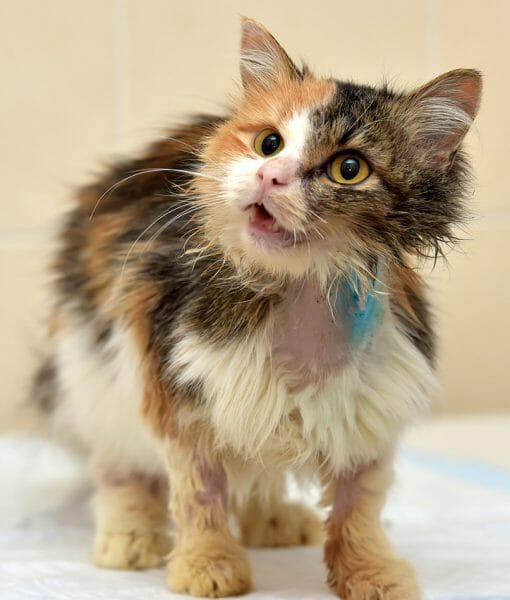
Hyperthyroidism vs. Hypothyroidism
Due to their nearly identical spelling, most people mix up these distinct disorders of the thyroid glands. Therefore, it is important that both conditions be clearly defined.
- Hypothyroidism. When the thyroid glands in the neck unsuccessfully generate the triiodothyronine (T3) and tetraiodothyronine (T4) hormones throughout the body in a sufficient manner, it causes the metabolism to underperform. A body bereft of the required hormones may experience extreme weakness and lethargy.
- Hyperthyroidism. By contrast, hyperthyroidism is marked by an excessive supply of the T3 and T4 hormones to the organs of the body. When this happens, the metabolism spikes, causing the organs to become oversaturated with unneeded hormones. Common indicators of this condition are agitated, wired behavior, increased eating or drinking habits, and noticeable weight loss. Feline immunodeficiency virus has some symptoms of hyperthyroidism. It is important to get a full blood panel and also check for FIV as well.




